No products in the cart.
Chicago Booth missionary: Sunil Kumar
Among the numerous Indian diaspora success stories, the incumbency since 2011 of Bangalore-born Dr. Sunil Kumar as dean and George Pratt Shultz professor of operations management at the University of Chicago Booth School of Business (estb.1898), is a story less told. Although not as well-known as the Harvard and Wharton B-schools, Chicago Booth isn’t just one of America’s many globally-reputed B-schools. Last month (October), the London-based weekly The Economist ranked it the world’s #1 B-school. Moreover, Forbes (USA) ranks it #6 and The Financial Times (London) #9 worldwide. Chicago Booth’s more famous 470 Indian alumni include Jaithirth (‘Jerry’) Rao, Luis Miranda, Dhiraj Rajaram and Satya Nadella.
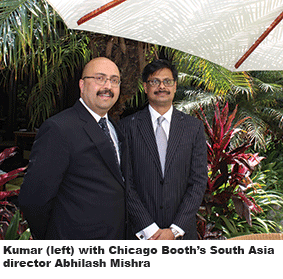 Newspeg. Sunil Kumar was visiting his hometown this summer to attend the IISc Global Alumni Conference 2015 and discuss ways and means to deepen the engagement of Chicago Booth with India Inc, captains of industry and government officials. Kumar also explored the possibilities of deepening the engagement of Chicago Booth with the University of Chicago’s first outpost in India, viz, the University of Chicago Center, Delhi (estb.2014).
Newspeg. Sunil Kumar was visiting his hometown this summer to attend the IISc Global Alumni Conference 2015 and discuss ways and means to deepen the engagement of Chicago Booth with India Inc, captains of industry and government officials. Kumar also explored the possibilities of deepening the engagement of Chicago Booth with the University of Chicago’s first outpost in India, viz, the University of Chicago Center, Delhi (estb.2014).
History. An alumnus of the National Institute of Technology, Surathkal, Karnataka, and the Indian Institute of Science, Bangalore, Kumar was awarded his Ph D in electrical engineering by the University of Illinois at Urbana Champaign in 1996. Subsequently, he signed up with the Graduate School of Business, Stanford University, where he served as Fred H. Merrill professor of operations, information and technology and senior associate dean for academic affairs for 14 years before being appointed dean of Chicago Booth four years ago. As dean, Kumar supervises the vital functions of faculty recruitment, syllabus formulation and infrastructure management and development at the school which has campuses in Chicago, London, and Hong Kong.
Direct talk. “The University of Chicago Center in Delhi is conducting path-breaking research in the area of social entrepreneurship, particularly in social behaviour modification, sanitation improvement and tuberculosis eradication. The Chicago Booth faculty includes several renowned social scientists, including Prof. Richard Thaler, a global authority on behaviour studies and author of the Social Nudge strategy. We have a strong and well-established connection with India and currently the largest national contingent of our full-time programme is from India, with many students awarded generous scholarships. The establishment of our center in Delhi will strengthen this bond,” says Kumar.
Future plans. With his understanding of the Indian and American higher education systems, Kumar believes there’s considerable opportunity for cooperation and development between Chicago Booth and B-schools/universities in India. “There’s a resurgence of private enterprise within the Indian economy and society. Chicago Booth and the University of Chicago — where Milton Friedman taught for many years — are globally reputed for their study and research programmes in entrepreneurship and free market economics. I believe Chicago Booth and our new center in Delhi will make very positive contributions to the growth and development of Indian industry and the economy,” says Kumar.
Right on!
Dilip Thakore (Bangalore)
Revolutionary educator
Aditya Patil is founder-CEO of the newly-promoted Ascend International School, Mumbai (AIS, estb.2011). AIS, which is receiving good notices from Mumbai’s cognoscenti, offers the primary years programme (PYP) of the International Baccalaureate Organisation (IBO), Geneva to 100 K-VI students mentored by 31 teachers. Promoted by the Kasegaon Education Society (KES), which runs 39 education institutions with an aggregate enrolment of 26,000 students in rural Maharashtra, AIS is modeled after the University Child Development School, a highly-reputed elementary based in Seattle, USA.
Newspeg. In August, AIS admitted its first batch of six grade VI students into its middle years programme (MYP).
History. The Kasegaon Education Society was founded in 1945 by Shri Rajarambapu Patil (Aditya’s grandfather) who also laid the foundations of the Sangli-based Rajarambapu group of companies with interests in manufacturing (edible oil, sugar, textiles) and the service sector (restaurants). With KES’ schools, colleges, and vocational training institutes highly reputed in rural Maharashtra, Aditya has imported the group’s 60 years’ experience of innovative education to Mumbai by promoting AIS.
“Having been educated in India, I am deeply aware of the limitations of the traditional teacher-centric education model and its rote memorisation and one-size-fits-all pedagogies. The objective of AIS is to offer an innovative curriculum and pedagogy based on contemporary research which accommodates the varied learning capabilities of children. Each student is enabled to understand concepts through education delivery best suited to her. Through individualised education, we produce real learning and develop confident, creative, reflective, and analytical thinkers,” says Patil, an alumnus of Mumbai University and the Narsee Monjee Institute of Management Studies, who worked with JP Morgan and in the family hospitality business prior to committing himself full-time to developing AIS.
Direct talk. “We have overturned the traditional education model by placing students — rather than teachers — at the centre of learning. Our primary school children learn through play, projects and interaction with teachers and peers. In particular, we greatly encourage peer-to-peer learning in AIS and have replaced homework with ‘home learning and thinking’ which is child-friendly and engaging,” says Patil.
Future plans. AIS has applied to IBO for accreditation to offer the MYP and IB diploma programmes, and will add a grade each year. “Our enrolments have doubled each year and we hope to reach our full capacity of 520 students soon. More important, we want AIS to become a model of contemporary research-based education and share best practices with other schools. We have already held several workshops where we have shared our peer teaching and individualised education models with primary school teachers,” says Patil.
Fair winds!
Dipta Joshi (Mumbai)
Test-prep innovator
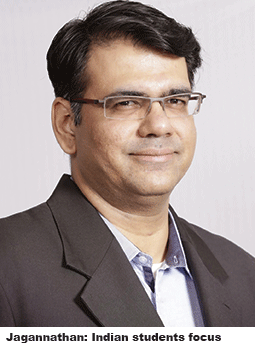 A computer applications graduate of the Dharmsinh Desai Institute of Technology, Nadiad, Gujarat and former IT professional, Arun Jagannathan is founder-CEO of the Bangalore-based CrackVerbal Edutech Pvt. Ltd, a fast-growing B-schools test preparation and admissions consultancy. Established in 2006 with six students, CrackVerbal owns two learning centres in Bangalore and Chennai with an aggregate enrolment of 1,250 students instructed by 15 faculty.
A computer applications graduate of the Dharmsinh Desai Institute of Technology, Nadiad, Gujarat and former IT professional, Arun Jagannathan is founder-CEO of the Bangalore-based CrackVerbal Edutech Pvt. Ltd, a fast-growing B-schools test preparation and admissions consultancy. Established in 2006 with six students, CrackVerbal owns two learning centres in Bangalore and Chennai with an aggregate enrolment of 1,250 students instructed by 15 faculty.
Offering coaching exclusively for GMAT (General Management Aptitude Test — which must be cleared for admission into top B-schools abroad) and GRE (Graduate Record Examination — good scores in which are essential for admission into postgraduate programmes of foreign universities), during the past nine years the company has enabled the entry of over 1,000 students into top-ranked B-schools and universities abroad including Harvard, Wharton, MIT, Kellogg, Duke, INSEAD, London Business School, Oxford and Cambridge, besides the Indian School of Business, Hyderabad and the IIMs.
Newspeg. In mid-September, Jagannathan hosted a promotional event in Kolkata, which is on the company’s shortlist of cities to launch a new CrackVerbal coaching centre. Earlier in June, it launched its revamped online GMAT study programme by including high-quality video lectures, interactive sessions and video-recording options.
History. After graduating in 2001, Jagannathan began his career with Wipro Technologies, Bangalore followed by stints with Sapient, Arcot Systems and Talisma Corporation. Following his deep interest in education, he began teaching part-time in coaching institutes preparing aspirants for the IIMs’ Common Admission Test (CAT), and progressing to prepare students for GMAT and GRE. With regular participation on popular MBA discussion forums such as www.pagalguy.com and www.beatthegmat.com, he became increasingly aware that most preparatory courses are designed for American students. Therefore in 2006, he quit his job at Talisma to design a GMAT curriculum customised to meet the learning needs of Indian students.
Direct talk. “Our curriculum and test-prep techniques are programmed to meet the needs of Indian students and our high-quality faculty set us apart from other coaching schools. Most of our instructors themselves average GMAT scores of 770 plus. Therefore, they dispense not just verbal or quantitative learning but pass on the benefit of actual test-prep experience,” says Jagannathan, who adds that the duration of CrackVerbal’s GMAT/GRE test prep courses vary from one-three months (fees: Rs.5,000-30,000).
Future plans. Enthused by public response to the company’s test- prep programmes, Jagannathan intends to expand operations by promoting new learning centres in Kolkata, Hyderabad, Pune, Mumbai and Delhi. “We also plan to invest heavily in marketing our GMAT and GRE online courses to reach a wider audience. The number of mid-career professionals signing up for executive MBA programmes which require good GMAT scores for entry, has been steadily rising. Since this segment may not be able to make it to a classroom every week, we expect an equally enthusiastic response to our online test-prep programmes,” says Jagannathan.
Baishali Mukherjee (Kolkata)
Malhotra’s progress
Umesh Malhotra is the Bangalore-based founder-CEO of Hippocampus Learning Centres Pvt. Ltd (HLC, estb.2010). Christened after a vital part of the brain governing learning and memory formation, HLC provides high quality, affordable early childhood and after-school primary education to 11,000 children in the three-six age group mentored by 600 teachers in 263 preschool centres sited in tier II, III towns and villages of Karnataka. Simultaneously, HLC has created employment opportunities for women in rural areas by hiring them as teachers.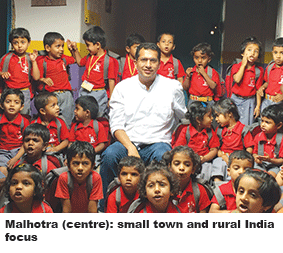
Newspeg. To mark its fifth anniversary celebrations earlier (July) this year, the HLC board approved a national rollout plan under the franchise model. In addition to running its ‘own and operate’ centres, HLC has started to franchise its well-researched activity-based preschool curriculum to like-minded government and private schools.
History. An alumnus of the blue-chip IIT-Madras, Malhotra began his career in 1990 with Infosys Technologies, the globally-reputed IT company where he gained valuable work experience before co-promoting Bangalore Labs Pvt Ltd, which was acquired by Planet One Asia for an undisclosed sum in 2003. In the same year, Malhotra ventured into social entrepreneurship and launched Hippocampus, an activity-based children’s library with a subscription-driven business model.
In 2007, the Hippocampus Reading Foundation launched its unique green, red, orange, white, blue and yellow (GROWBY) colour coded library programme to enable teachers (librarians) to recommend books according to children’s reading capabilities. The GROWBY programme has been adopted by more than 175 primary school libraries countrywide during the past three years.
In 2010, greatly influenced by The Beautiful Tree and its author James Tooley, champion of low-cost private schools, Malhotra raised Rs.1.8 crore as angel funding to promote HLC.
Direct talk.“While touring Karnataka’s Chitradurga district to promote the GROWBY initiative, I discovered an almost total absence of pre-primaries for infants. Children were being directly admitted into class I and plunged into the state board syllabus. While in cities children get basic English and math education in preschools which prepares them for primary schooling, rural children were dropping out in large numbers from primaries because they were totally unprepared for them. Thus was born the idea of Hippocampus Learning Centres to provide innovative and low-cost early childhood care and education in small-town and rural India,” recalls Malhotra.
Tuition fees (annual). Rs 3,500-7,000 (calibrated according to household incomes).
Future plans. Malhotra plans to roll out HLC nationally. “We have set ourselves a ‘Mission Finland’ goal. By 2020, we intend to provide high quality education to 200,000 preschool children (as many as in Finland) at 1 percent the cost of ECCE in that country,” he enthuses.
Way to go, Bro!
Paromita Sengupta (Bangalore)
Maths learning innovator
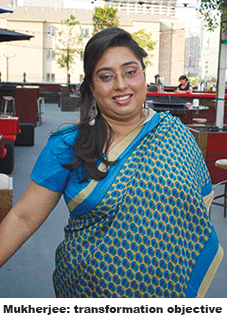 Ratuli Mukherjee is mathematics and international partnerships coordinator at the top-ranked La Martiniere for Girls, Kolkata and teaches class IX-XII students. An alumna of La Martiniere Girls’ College, Lucknow and Netaji Subhas University, Kolkata, she writes a popular maths blog and is a published author of a middle school mathematics textbook. A resource expert for Macmillan Publishers, she also conducts maths workshops and seminars for teachers in addition to working with the Kolkata-based NGO All Bengal Women’s Union, to improve math/science teaching-learning methods for underprivileged girl children.
Ratuli Mukherjee is mathematics and international partnerships coordinator at the top-ranked La Martiniere for Girls, Kolkata and teaches class IX-XII students. An alumna of La Martiniere Girls’ College, Lucknow and Netaji Subhas University, Kolkata, she writes a popular maths blog and is a published author of a middle school mathematics textbook. A resource expert for Macmillan Publishers, she also conducts maths workshops and seminars for teachers in addition to working with the Kolkata-based NGO All Bengal Women’s Union, to improve math/science teaching-learning methods for underprivileged girl children.
Newspeg. In July this year, Mukherjee’s innovative project integrating science museums to stimulate interest in math learning was acknowledged/certified by the British Council’s prestigious Global Teacher Accreditation Programme, a worldwide initiative that seeks partnerships with schools to develop creative school curriculums. (Mukherjee was on a private visit to Lucknow last month (October) when this correspondent interviewed her).
History. India has 26 national science museums. Mukherjee’s project aims to make use of them for teaching-learning purposes, given that the majority of schools countrywide lack science and maths laboratories.
Mukherjee conducted her research programme at the Birla Industrial and Technological Museum (BITM), Kolkata. “BITM’s mathematics gallery makes abstract math concepts tangible by using 3D models. Students are not expected to ‘assume’ as is the standard practice in classroom teaching. Instead, they get the opportunity to grasp theoretical constructs such as conic sections, trigonometry and progressions through hands-on experiences. Though several schools take their students for field visits to science museums, they tend to rush them through. There’s little awareness that maths galleries can help children get over fear of maths,” says Mukherjee.
Although all national museums don’t host maths galleries, Mukherjee hopes the certification of her project by British Council India and Cambridge Education Foundation will prompt them to establish maths centres/galleries.
Direct talk. “Considerable resources are invested in establishing science museums. But they are regarded as tourist/cultural centres offering visual galleries. However, my experience with BITM indicates that museums can be transformed into research centres for innovative maths and other learning programmes,” says Mukherjee.
Future plans. Currently working on a book titled Math Story Tales for class VII-IX students, Mukherjee is intensifying her research of this dreaded subject, which will excite and engage students from all strata of society.
Wind beneath your wings!
Puja Awasthi (Lucknow)
RTE champion
Ambarish Rai is the national convener-president of the Right to Education (RTE) Forum (estb. 2010), which describes itself as a “platform of national education networks, teachers’ unions, people’s movements and prominent educationists with a combined strength of 10,000 NGOs from all over India”. The objective of the forum is to “achieve the goal of equitable and quality education for all children through the realisation of the RTE Act, 2009 in its true letter and spirit”.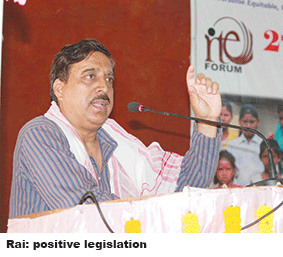
Newspeg. The RTE Forum is scheduled to convene the first National Convention of School Management Committees (SMCs) on December 1. Under s. 21 of the RTE Act, SMCs comprising elected representatives of local governments, and parents of children in government and aided schools (with parents constituting a three-fourths majority), are obliged to prepare school development plans, monitor the operation of each school and utilisation of government grants.
History. A science and law alum of Lucknow University, he was also elected general secretary of the Communist Party of India (CPI)-affiliated All India Students’ Federation (AISF). After moving to Delhi in the new millennium, he was appointed national organizer of the National Alliance for the Fundamental Right to Education (NAFRE, estb. 1998), and later national convener of People’s Campaign for Common School System in 2005. These NGOs played a major role in pressurising the Congress-led UPA I and II governments to amend the Constitution and legislate the historic RTE Act, which makes it mandatory for the State to provide free and compulsory elementary education (classes I-VIII) to all children in the 6-14 age group.
Direct talk. “Although the RTE Act directs SMCs to assume ownership of all elementary schools and manage and monitor them to create community owned schools, state government bureaucracies have neglected the enablement of SMCs. Every school has to have a development plan drawn up by these committees, and government funds have to devolve upon the SMCs. But this hasn’t happened anywhere over the past five years. The purpose of the national convention is to apprise SMCs of their rights and responsibilities, and to create a national platform to advise them of ways and means to discharge their duties and obligations under the RTE Act,” says Rai.
Future plans. Despite its implementation difficulties, Rai is convinced that the RTE Act is positive legislation committed to universalisation of vitally important elementary education. “I am optimistic that as its flaws are corrected, the Act will achieve its objectives and will be extended to cover secondary education as well. Our interpretation of the adoption of the new SDGs (sustainable development goals) by the United Nations is that it’s mandatory for the Union government to universalise free and compulsory secondary education as well,” says Rai.
Power to your elbow!
Autar Nehru (Delhi)














Add comment